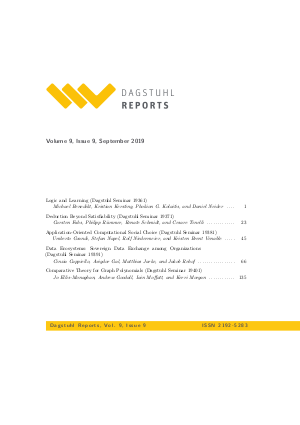Dagstuhl Reports, Volume 9, Issue 9
-
Part of:
Volume:
Dagstuhl Reports, Volume 9
Journal: Dagstuhl Reports (DagRep)

Event
- Dagstuhl Seminars 19361, 19371, 19381, 19391, 19401
Publication Details
- published at: 2020-02-19
- Publisher: Schloss Dagstuhl – Leibniz-Zentrum für Informatik
- DBLP: db/journals/dagstuhl-reports/dagstuhl-reports9
Access Numbers
- Detailed Access Statistics available here
-
Total Document Accesses (updated on a weekly basis):
0PDF Downloads
Documents
Dagstuhl Reports, Volume 9, Issue 9, September 2019, Complete Issue
Abstract
Cite as
Dagstuhl Reports, Volume 9, Issue 9, pp. 1-157, Schloss Dagstuhl – Leibniz-Zentrum für Informatik (2020)
Copy BibTex To Clipboard
@Article{DagRep.9.9,
title = {{Dagstuhl Reports, Volume 9, Issue 9, September 2019, Complete Issue}},
pages = {1--157},
journal = {Dagstuhl Reports},
ISSN = {2192-5283},
year = {2020},
volume = {9},
number = {9},
publisher = {Schloss Dagstuhl -- Leibniz-Zentrum f{\"u}r Informatik},
address = {Dagstuhl, Germany},
URL = {https://drops.dagstuhl.de/entities/document/10.4230/DagRep.9.9},
URN = {urn:nbn:de:0030-drops-119895},
doi = {10.4230/DagRep.9.9},
annote = {Keywords: Dagstuhl Reports, Volume 9, Issue 9, September 2019, Complete Issue}
}
Dagstuhl Reports, Table of Contents, Volume 9, Issue 9, 2019
Abstract
Cite as
Dagstuhl Reports, Volume 9, Issue 9, pp. i-ii, Schloss Dagstuhl – Leibniz-Zentrum für Informatik (2020)
Copy BibTex To Clipboard
@Article{DagRep.9.9.i,
title = {{Dagstuhl Reports, Table of Contents, Volume 9, Issue 9, 2019}},
pages = {i--ii},
journal = {Dagstuhl Reports},
ISSN = {2192-5283},
year = {2020},
volume = {9},
number = {9},
publisher = {Schloss Dagstuhl -- Leibniz-Zentrum f{\"u}r Informatik},
address = {Dagstuhl, Germany},
URL = {https://drops.dagstuhl.de/entities/document/10.4230/DagRep.9.9.i},
URN = {urn:nbn:de:0030-drops-119902},
doi = {10.4230/DagRep.9.9.i},
annote = {Keywords: Table of Contents, Frontmatter}
}
Logic and Learning (Dagstuhl Seminar 19361)
Abstract
Cite as
Michael Benedikt, Kristian Kersting, Phokion G. Kolaitis, and Daniel Neider. Logic and Learning (Dagstuhl Seminar 19361). In Dagstuhl Reports, Volume 9, Issue 9, pp. 1-22, Schloss Dagstuhl – Leibniz-Zentrum für Informatik (2020)
Copy BibTex To Clipboard
@Article{benedikt_et_al:DagRep.9.9.1,
author = {Benedikt, Michael and Kersting, Kristian and Kolaitis, Phokion G. and Neider, Daniel},
title = {{Logic and Learning (Dagstuhl Seminar 19361)}},
pages = {1--22},
journal = {Dagstuhl Reports},
ISSN = {2192-5283},
year = {2020},
volume = {9},
number = {9},
editor = {Benedikt, Michael and Kersting, Kristian and Kolaitis, Phokion G. and Neider, Daniel},
publisher = {Schloss Dagstuhl -- Leibniz-Zentrum f{\"u}r Informatik},
address = {Dagstuhl, Germany},
URL = {https://drops.dagstuhl.de/entities/document/10.4230/DagRep.9.9.1},
URN = {urn:nbn:de:0030-drops-118425},
doi = {10.4230/DagRep.9.9.1},
annote = {Keywords: Artificial Intelligence, Automated reasoning, Databases, Deep Learning, Inductive Logic Programming, Logic, Logic and Learning, Logic for Machine Learning, Logic vs. Machine Learning, Machine Learning, Machine Learning for Logic, Neurosymbolic methods}
}
Deduction Beyond Satisfiability (Dagstuhl Seminar 19371)
Abstract
Cite as
Carsten Fuhs, Philipp Rümmer, Renate Schmidt, and Cesare Tinelli. Deduction Beyond Satisfiability (Dagstuhl Seminar 19371). In Dagstuhl Reports, Volume 9, Issue 9, pp. 23-44, Schloss Dagstuhl – Leibniz-Zentrum für Informatik (2020)
Copy BibTex To Clipboard
@Article{fuhs_et_al:DagRep.9.9.23,
author = {Fuhs, Carsten and R\"{u}mmer, Philipp and Schmidt, Renate and Tinelli, Cesare},
title = {{Deduction Beyond Satisfiability (Dagstuhl Seminar 19371)}},
pages = {23--44},
journal = {Dagstuhl Reports},
ISSN = {2192-5283},
year = {2020},
volume = {9},
number = {9},
editor = {Fuhs, Carsten and R\"{u}mmer, Philipp and Schmidt, Renate and Tinelli, Cesare},
publisher = {Schloss Dagstuhl -- Leibniz-Zentrum f{\"u}r Informatik},
address = {Dagstuhl, Germany},
URL = {https://drops.dagstuhl.de/entities/document/10.4230/DagRep.9.9.23},
URN = {urn:nbn:de:0030-drops-118432},
doi = {10.4230/DagRep.9.9.23},
annote = {Keywords: abduction, automated deduction, interpolation, quantifier elimination, synthesis}
}
Application-Oriented Computational Social Choice (Dagstuhl Seminar 19381)
Abstract
Cite as
Umberto Grandi, Stefan Napel, Rolf Niedermeier, and Kristen Brent Venable. Application-Oriented Computational Social Choice (Dagstuhl Seminar 19381). In Dagstuhl Reports, Volume 9, Issue 9, pp. 45-65, Schloss Dagstuhl – Leibniz-Zentrum für Informatik (2020)
Copy BibTex To Clipboard
@Article{grandi_et_al:DagRep.9.9.45,
author = {Grandi, Umberto and Napel, Stefan and Niedermeier, Rolf and Venable, Kristen Brent},
title = {{Application-Oriented Computational Social Choice (Dagstuhl Seminar 19381)}},
pages = {45--65},
journal = {Dagstuhl Reports},
ISSN = {2192-5283},
year = {2020},
volume = {9},
number = {9},
editor = {Grandi, Umberto and Napel, Stefan and Niedermeier, Rolf and Venable, Kristen Brent},
publisher = {Schloss Dagstuhl -- Leibniz-Zentrum f{\"u}r Informatik},
address = {Dagstuhl, Germany},
URL = {https://drops.dagstuhl.de/entities/document/10.4230/DagRep.9.9.45},
URN = {urn:nbn:de:0030-drops-118445},
doi = {10.4230/DagRep.9.9.45},
annote = {Keywords: ai for the social good, collective decision making, multi-agent systems, social choice}
}
Data Ecosystems: Sovereign Data Exchange among Organizations (Dagstuhl Seminar 19391)
Abstract
Cite as
Cinzia Cappiello, Avigdor Gal, Matthias Jarke, and Jakob Rehof. Data Ecosystems: Sovereign Data Exchange among Organizations (Dagstuhl Seminar 19391). In Dagstuhl Reports, Volume 9, Issue 9, pp. 66-134, Schloss Dagstuhl – Leibniz-Zentrum für Informatik (2020)
Copy BibTex To Clipboard
@Article{cappiello_et_al:DagRep.9.9.66,
author = {Cappiello, Cinzia and Gal, Avigdor and Jarke, Matthias and Rehof, Jakob},
title = {{Data Ecosystems: Sovereign Data Exchange among Organizations (Dagstuhl Seminar 19391)}},
pages = {66--134},
journal = {Dagstuhl Reports},
ISSN = {2192-5283},
year = {2020},
volume = {9},
number = {9},
editor = {Cappiello, Cinzia and Gal, Avigdor and Jarke, Matthias and Rehof, Jakob},
publisher = {Schloss Dagstuhl -- Leibniz-Zentrum f{\"u}r Informatik},
address = {Dagstuhl, Germany},
URL = {https://drops.dagstuhl.de/entities/document/10.4230/DagRep.9.9.66},
URN = {urn:nbn:de:0030-drops-118450},
doi = {10.4230/DagRep.9.9.66},
annote = {Keywords: Data sovereignty, Data ecosystems, Business models, Data integration, Ethics}
}
Comparative Theory for Graph Polynomials (Dagstuhl Seminar 19401)
Abstract
Cite as
Jo Ellis-Monaghan, Andrew Goodall, Iain Moffatt, and Kerri Morgan. Comparative Theory for Graph Polynomials (Dagstuhl Seminar 19401). In Dagstuhl Reports, Volume 9, Issue 9, pp. 135-155, Schloss Dagstuhl – Leibniz-Zentrum für Informatik (2020)
Copy BibTex To Clipboard
@Article{ellismonaghan_et_al:DagRep.9.9.135,
author = {Ellis-Monaghan, Jo and Goodall, Andrew and Moffatt, Iain and Morgan, Kerri},
title = {{Comparative Theory for Graph Polynomials (Dagstuhl Seminar 19401)}},
pages = {135--155},
journal = {Dagstuhl Reports},
ISSN = {2192-5283},
year = {2020},
volume = {9},
number = {9},
editor = {Ellis-Monaghan, Jo and Goodall, Andrew and Moffatt, Iain and Morgan, Kerri},
publisher = {Schloss Dagstuhl -- Leibniz-Zentrum f{\"u}r Informatik},
address = {Dagstuhl, Germany},
URL = {https://drops.dagstuhl.de/entities/document/10.4230/DagRep.9.9.135},
URN = {urn:nbn:de:0030-drops-118460},
doi = {10.4230/DagRep.9.9.135},
annote = {Keywords: graph polynomials, graph and matroid invariants, Tutte polynomial, topological and algebraic graph theory}
}